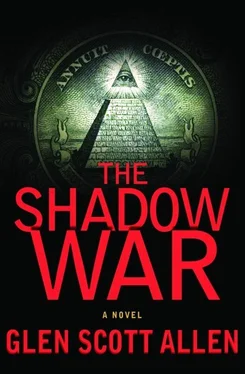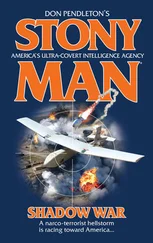Glen Allen - The shadow war
Здесь есть возможность читать онлайн «Glen Allen - The shadow war» весь текст электронной книги совершенно бесплатно (целиком полную версию без сокращений). В некоторых случаях можно слушать аудио, скачать через торрент в формате fb2 и присутствует краткое содержание. Жанр: Триллер, на английском языке. Описание произведения, (предисловие) а так же отзывы посетителей доступны на портале библиотеки ЛибКат.
- Название:The shadow war
- Автор:
- Жанр:
- Год:неизвестен
- ISBN:нет данных
- Рейтинг книги:5 / 5. Голосов: 1
-
Избранное:Добавить в избранное
- Отзывы:
-
Ваша оценка:
- 100
- 1
- 2
- 3
- 4
- 5
The shadow war: краткое содержание, описание и аннотация
Предлагаем к чтению аннотацию, описание, краткое содержание или предисловие (зависит от того, что написал сам автор книги «The shadow war»). Если вы не нашли необходимую информацию о книге — напишите в комментариях, мы постараемся отыскать её.
The shadow war — читать онлайн бесплатно полную книгу (весь текст) целиком
Ниже представлен текст книги, разбитый по страницам. Система сохранения места последней прочитанной страницы, позволяет с удобством читать онлайн бесплатно книгу «The shadow war», без необходимости каждый раз заново искать на чём Вы остановились. Поставьте закладку, и сможете в любой момент перейти на страницу, на которой закончили чтение.
Интервал:
Закладка:
The rooms of this secret village had rounded ceilings and walls, the doors were oval-shaped rather than rectangular and set with large metal wheels in their centers, and everywhere there wound parallel rows of pipes and conduits. But, unlike in a submarine, the hallways bent and twisted at sharp angles, and were constructed of three-meter-thick concrete; beneath the rooms and hallways were dozens of oversized shock absorbers, each a meter wide and driven ten meters into solid granite. The curved, angled hallways, massive walls, and giant springs were all designed to allow the structure to withstand seismic shock waves of up to 500 psi-say, for instance, from the nearby impact of a one-megaton nuclear warhead.
The buried village's inhabitants didn't call it Uzhur-4; they called it, with fierce Russian irony, Solnechnyy Uzhur-Sunny Uzhur. There were only thirty such inhabitants, each of whom visited for a two-week duty shift, after which he returned for ten days to his surface home and wife and children, but as silent and pale as the sterile crypt in which he kept vigil.
And what they kept vigil over were the thirty-three SS-18 intercontinental ballistic missiles of the 39th Missile Division, 33rd Guards Missile Army, Omsk. Each missile was topped by the most powerful nuclear weapon ever created, the R-36M, twenty-five megatons of instantaneous hell. The official manual of the Strategic Rocket Forces labeled the missiles "Voyevoda," a word from the old Russian that meant something like Chieftain, or simply Boss. The name the Americans gave the missile was even simpler, and perhaps more accurate: Satan.
Uzhur-4 was a village of uniformly light gray and green rooms, harshly echoing hallways, shadowless fluorescent lights, unpalatable recycled air, and absolutely inviolate routines. A village whose sole purpose was to destroy a significant portion of the world. A village that didn't exist.
In this village that didn't exist, a group of men in pale blue overalls were sitting in a room with couches, chairs, a Ping-Pong table, a television set-everything that might have made the room a den in someone's home. But the walls were of concrete painted gray, the floor was also concrete but painted pale green, the lights were harsh fluorescents, and the men acted with the controlled ease of soldiers who might at any moment be required to resume rigid discipline. And, even though the room was on the surface, there were no windows, for the room, and the small building in which it was contained, were buried under ten feet of earth, earth that was planted with pine trees and shrubs and therefore, from the air, indistinguishable from the other dozens of small hills around it.
The men were watching television: a news report from Moscow about the growing Czechoslovakian crisis. The stolid reporter was saying that anti-Soviet leaflets were being distributed in Prague, that a radio station had been seized by rebels and renamed "Free Bratislava," and that it was broadcasting calls to the Czech people to resist by all means necessary the "invasion" by tanks and soldiers of the Warsaw Pact. One troop train had already been derailed, and many Red Army soldiers had been killed, some by weapons clearly marked "Made in the U.S.A." Finally the broadcast changed to other news.
"Counterrevolutionary bastards!" said one of the men sitting around the television.
"To think, one hundred and forty thousand brave Red Army men died ridding them of Hitler-and this is how they thank us!"
Another of the men-the name tag on his overalls read ORLOV, N.-turned to a man on the couch next to him, whose tag read LEVEROTOV, V.
"What do you think?" he said. "Will NATO come to the rebels' aid?"
"I think," Leverotov said, putting out a cigarette, "our 'sausages' are a cold compress on the hotheads in the Pentagon. But they are wild Americans." He smiled. "Who knows that they will dare." He looked up at a clock. "Come on, it's time for our watch. And remember, we have a very important drill today."
Saying "pakah," giving a few mock salutes to the other men in the room, they walked out of the room, down a short hallway to a small medical clinic.
After a thorough medical examination, they reentered the hallway and walked to an elevator. There was a keypad next to the elevator, and Leverotov punched in a numbered code. The doors opened and they entered, typed another numbered code on another pad inside the elevator. Its doors closed and it began to descend.
Thirty minutes later found the two men sitting in another room, much smaller, with barely enough space for the two high-backed, padded chairs they occupied, and a huge instrument panel that stretched the length of the room. They sat at opposite ends of the panel. Each of them was holding a small white metal key, and both keys were inserted into identical locks. Their eyes were watching two small screens, each set above the panel, angled down toward them. The screens flickered for a moment, and then each displayed, in an incandescent, wavering green, two words: BATTLE ALERT.
Orlov looked quickly over to Leverotov. "Battle Alert?" he said, his voice rising slightly. "Not Training Alert?"
"Shut up," said Leverotov. "You know the procedure. Follow it." And then he began a countdown. "Three, two, one… turn!"
Simultaneously the two men turned the small, white keys. An amber light above each lock went off, and immediately a red light next to it came on. Each man then raised his right arm slightly and positioned an extended index finger over a large round white button. Their eyes were fixed on rows of lights beneath each button, watching closely as the lights turned in sequence from red to green.
When the last little round light had turned green, Leverotov said, "Arming sequence complete," to which Orlov replied, "Confirmed, arming sequence complete."
The words "BATTLE ALERT" disappeared from the screens over their heads, instantly replaced with the words "RED STAR." Both men looked to the binders open before them, traced with a finger down a column of words.
"Firing verification Red Star," said Leverotov.
"Firing verification Red Star confirmed," replied Orlov.
"On my mark," said Leverotov, and raised his finger to the white button, while Orlov, like a mirror image, did the same. "Three, two, one… fire!"
Both fingers pressed and held the white buttons. The green lights above the buttons blinked out. The words "RED STAR" disappeared from the TV screens. Still the men held down the white buttons. There was a long moment of silence… then a speaker set in the ceiling of the room crackled.
"Fighting watch alpha," said a staticky voice from the speaker.
"Fighting watch alpha aye," said Leverotov.
"Alert canceled. Repeat, alert canceled. Stand down. Repeat, stand down."
"Alert canceled confirmed," replied Leverotov. "Fighting watch alpha out."
He moved his hand to his key, looked over to Orlov, waiting for him to do the same.
Orlov looked over at Leverotov. "That's not-"
"Your key, Captain Orlov," Leverotov said.
Orlov raised his hand to his own key. Once again, Leverotov counted down from three to one; once again, they turned their keys simultaneously, this time counterclockwise, back to Lock.
"Now," said Leverotov, "make your record. They'll be cracking the hatch soon, I want to be on time."
Orlov shrugged, pulled a logbook toward the edge of the panel, began writing down figures. He happened to glance again at the instrument panel. "What the hell?" he said.
Leverotov looked at his own panel. On both sides, a red light was blinking.
The two men looked at each other. Leverotov immediately leaned forward, pressed the button for the intercom.
But before he could say anything, Orlov said, "Wait!" He pointed at the red light in front of him, which had stopped blinking. Leverotov looked at his; it was now off, too.
Читать дальшеИнтервал:
Закладка:
Похожие книги на «The shadow war»
Представляем Вашему вниманию похожие книги на «The shadow war» списком для выбора. Мы отобрали схожую по названию и смыслу литературу в надежде предоставить читателям больше вариантов отыскать новые, интересные, ещё непрочитанные произведения.
Обсуждение, отзывы о книге «The shadow war» и просто собственные мнения читателей. Оставьте ваши комментарии, напишите, что Вы думаете о произведении, его смысле или главных героях. Укажите что конкретно понравилось, а что нет, и почему Вы так считаете.












